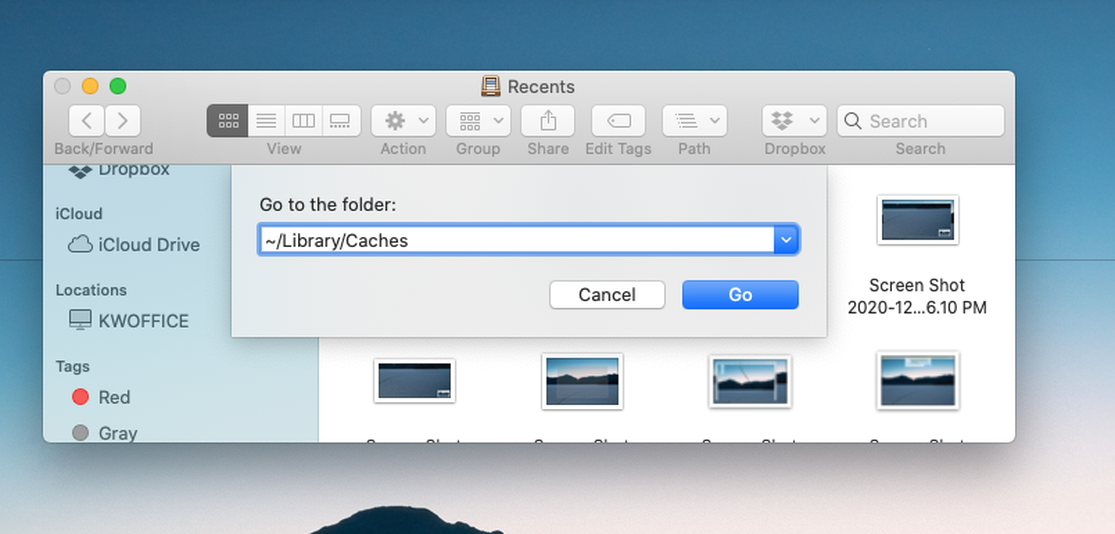Many of your daily computer activities — like opening programs, logging onto email, and navigating websites — are saved as temporary files within your computer. This is called caching, which, as Apple puts it, “helps reduce internet data usage and speed up software installation on Mac computers, iOS and iPadOS devices, and Apple TV.”
When you visit a website, for example, your browser will download data like images, scripts, and login credentials and save it all in a cached folder. When you visit that same site in the future, your browser simply (and quickly) loads data from the folder it’s already created. That way, your computer doesn’t have to spend time downloading all of that information again — it can just pull it from the cache.
There are a few different types of cached data: user or app data that saves information for certain apps; system cache, which your operating system uses to save process information; and browser cache, which saves your web browsing activity.
Convenient, right? But it’s important to clear this cached information every now and then to keep your data safe and free up disk space, which helps your operating system run more smoothly. If you’re having issues with certain apps, it may also be time to clear your cache.
Here’s how to get the job done. (Keep in mind: After clearing this data, you may find that when you visit certain websites, you will need to enter your credentials even if you didn’t have to before.)
How to clear your user/app cache on Mac
Mac makes it easy to clear your cached data using simple keyboard shortcuts.
-
From your Finder window, hit shift, command, and G.
-
The “Go to Folder” window will pop up. Enter the following command in the search box: ~/Library/Caches. You can also access this command by opening Finder and navigating to Go > Go to Folder from the menu.

Image: Screenshot: Kristin Wong
-
Hit the “Go” button. A folder will open that includes your Mac’s cached files.
-
From this screen, you can browse each folder and manually delete specific cached files by dragging them to the Trash (and later emptying the Trash). If you know the specific app or process you want to clear, you can select the folder and move it to Trash.

Image: screenshot: Kristin Wong
-
If you want to clear your entire system cache, hit command and A to select every folder, then hit command and delete.
-
A window will pop up confirming you want to delete the files and asking you for your Mac’s password.

Image: Screenshot: Kristin Wong
Once you enter your password, Mac will clear your cache.
How to clear your system cache on Mac
System cache doesn’t take up as much space as app or user cache. These are typically files generated by Mac’s operating system, which means you should be a bit more careful when choosing what to delete. You don’t want to accidentally erase important files that keep your system running normally.
If you know what you’re doing and the specific system folders you want to empty, here’s how to access your system cache.
-
From your Finder window, hit shift, command, and G.
-
The “Go to Folder” window will pop up. Enter the following command in the search box: /Library/Caches (without the ~ that you used above). You can also access this command by opening Finder and navigating to Go > Go to Folder from the menu.

Image: Screenshot: Kristin Wong
-
Take care not to delete the actual folder, but you can clear their contents by dragging them to = Trash. Then, make sure to empty your Trash.
How to clear your browser cache
Clearing your browser cache is relatively easy, but instructions will vary depending on what browser you use. Here’s how to clear your cache in Google Chrome, Safari, and Firefox.
Google Chrome

Image: Screenshot: Kristin Wong
-
From the “Clear Browsing Data” window choose the time range of data you want to clear. Select “all time” to delete everything.
-
Check the boxes marked “Cookies and other site data” and “Cached images and files.” Check “browsing history” if you’d like to delete this information, too.
-
Hit the “clear data” button.
Safari
-
Open Safari.
-
From the Safari drop down menu, select Preferences.
-
Navigate to the Advanced tab. Check the box marked, “Show Develop menu in menu bar.” Close the window.

Image: Screenshot: Kristin Wong
-
From the toolbar, select the Develop drop down menu and click Empty Cache. If you want to delete your browser history, select the History drop down, then Clear History.
Firefox
-
Open Firefox.
-
From the browser’s main menu, select History > Clear Recent History.
-
From the window that pops up, select the time range of data you want to clear: last hour, last two hours, last four hours, today or everything. Select “Everything” to delete all cached data.
-
Click on the arrow next to”Details,” which will allow you to choose the data you want to delete. To delete everything, make sure each box is checked. To only delete your browser cache, just check the box labeled “Cache.”
-
Click on the “Clear now” button to delete your data.
